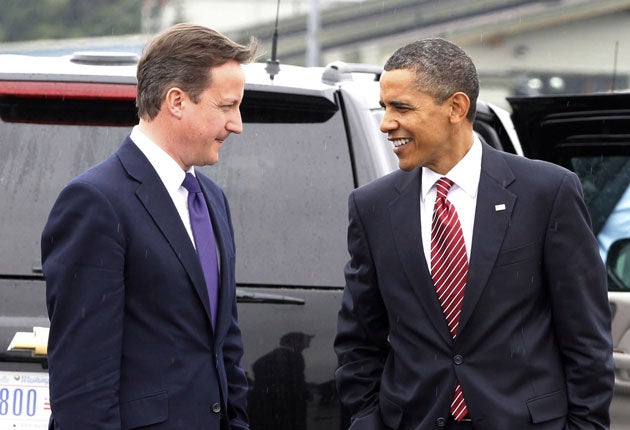Cameron digs in over Falklands as oil revives former tension
PM tells Argentina's President Cristina Kirchner that islands' sovereignty is not up for discussion

David Cameron is to issue a strong warning that he will never negotiate over the sovereignty of the Falklands.
A tense stand-off between the Prime Minister and Cristina Fernandez de Kirchner, the President of Argentina, is expected when they hold a brief meeting during the G20 summit in Toronto, Canada, which ends today.
Argentina is using every opportunity at international meetings to press its claim to the Falklands after the British company Rockhopper announced this month there are "positive signs" of oil being discovered in the waters around the South Atlantic islands. Last Thursday, Argentina persuaded a United Nations committee to call for talks on the islands' future.
Mr Cameron will deliver a tough "hands off" message to Mrs Kirchner in the hope of stopping in its tracks the latest diplomatic offensive by her country. "He will make it very clear that our position on the Falklands has not changed and will not change," one British source said yesterday. "Our stance remains as robust as ever."
The Prime Minister will tell the Argentinian President that the drilling for oil is an entirely legitimate activity and the islanders have every right to develop their economy. It is not yet clear if the likely oil resources will be a commercially viable proposition.
Since British forces expelled the Argentinians in the 1982 war after they invaded the Falklands, successive governments have been adamant that sovereignty is not up for discussion unless the islanders want it to be.
British officials will counter the new offensive by Argentina by saying the status of the islands should not be changed without the residents' consent, and that the inhabitants want them to remain under British control. They will argue that Britain's claim is legally watertight, as it is based on the principle of self-determination.
There were signs of international pressure building on Britain in March, when Hillary Clinton, the US Secretary of State, encouraged talks between London and Buenos Aires and a State Department official referred to the islands as the Malvinas. Formally, the US recognises British "administration" of the Falklands, and the Foreign Office does not expect Washington's approach to change.
The Falklands were not on the agenda when Mr Cameron met President Barack Obama before the two-day G20 summit got under way yesterday with a working dinner in Toronto.
The G8 conference in Deerhurst, north of Toronto, arranged just ahead of the G20, ended yesterday without any renewed commitment to the group's landmark pledge at its 2005 summit in Gleneagles to double annual aid to the world's poorest nations to $50bn by this year.
The meeting approved a $5bn initiative over five years to tackle maternal and child deaths in developing nations, and repeated the G8's support for the Millennium Development Goals, set by the UN and due to be delivered by 2015. Although the G8's communiqué pledged to "reaffirm our commitments" on aid, the absence of a specific reference to the Gleneagles targets angered aid agencies, who say the goal will be missed by between $10bn and $20bn and has now been quietly buried.
Despite Russia's initial reservations, Mr Cameron pushed for and secured a declaration that Iran should respect the rule of law amid a crackdown on opposition supporters that began when government forces crushed 2009 post-election protests. "We expect the government of Iran to respect the rule of law and freedom of expression as outlined in the international parties to which Iran is a party," the G8 said.
On Friday night, Mr Cameron discussed Iran at his first talks with President Dmitry Medvedev of Russia, one of several "get to know you" meetings the Prime Minister held with other world leaders during the G8 summit. Downing Street said a "constructive" 45-minute meeting with President Medvedev "represented the first step towards a renewed relationship between UK and Russia".
A spokesman said: "The Prime Minister made clear that there were still points of disagreement between the UK and Russia, and he specifically raised the death of Alexander Litvinenko. But he also stressed that the UK and Russia should work more closely together to build a better relationship focused around the economy, climate change and academic co-operation."
The G8 "deeply regretted" the loss of life that occurred when Israeli commandos raided an aid flotilla off Gaza in May, killing nine pro-Palestinian activists, and welcomed Israel's decision to set up an independent public commission to investigate the incident. The summit also welcomed Israel's decision to relax parts of its blockade on Hamas-controlled Gaza, saying "current arrangements are not sustainable and must be changed".
The group also backed South Korea, which is pushing for a UN Security Council resolution against North Korea over the sinking of the South Korean corvette Cheonan, in which 46 sailors died.
Join our commenting forum
Join thought-provoking conversations, follow other Independent readers and see their replies
Comments